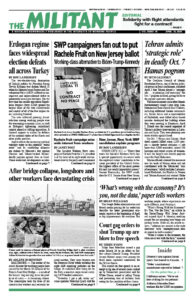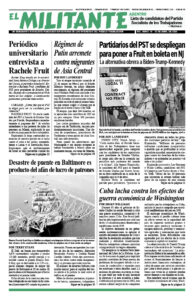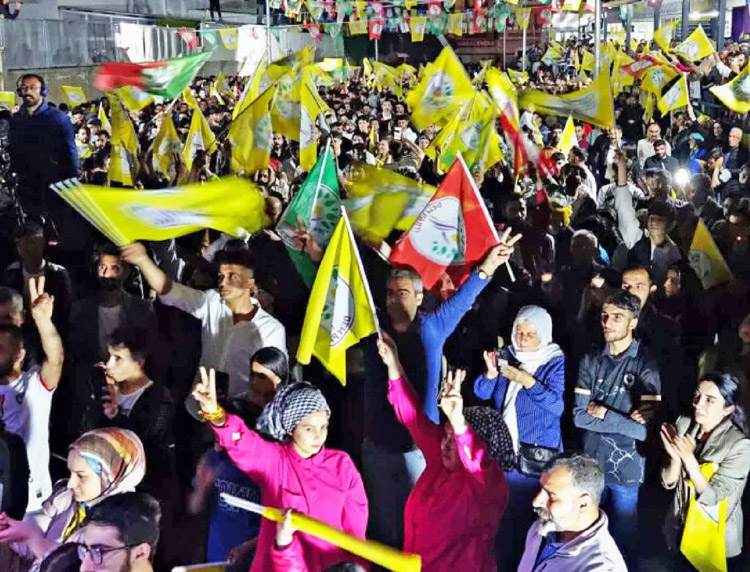The two-decades-long domination of Turkish politics by President Recep Tayyip Erdogan was shaken March 31 when his Islamist-based Justice and Development Party (AKP) suffered an unexpected and unprecedented defeat in nationwide municipal elections. For the first time the secular opposition Republican People’s Party (CHP) gained the largest share of the vote countrywide and control of all of the five largest cities, including Istanbul.
The vote reflected growing dissatisfaction among working people over the worsening economic crisis, as well as Erdogan’s tightening centralized control aimed at stifling opposition. It showed support to actions in defense of the national rights of the Kurds and other public protests.
And it reflects the increasing political volatility today as the capitalist “world order” and its conflicting alliances are shaken by Moscow’s war against Ukraine and Tehran-backed Hamas’ deadly pogrom against Jews in Israel. These watershed developments accelerate the world capitalist crisis, as ruling classes everywhere look to protect their national interests at all costs.
Turkey touches on both conflicts, geographically straddling Europe and Asia as well as the Mediterranean and the Black Sea. Turkey is a member of the U.S-led NATO alliance while courting Moscow, Beijing and Tehran, all adversaries of Washington. With a foot in both camps, Erdogan tries to advance Turkish capitalist interests and his own power.
Erdogan has taken steps to mend relations with regional powers, from Egypt to Saudi Arabia, while backing off from supporting the Muslim Brotherhood and other Islamist groups. He also sought to establish warmer relations with Israel, but after Oct. 7 he demagogically outdid neighboring Arab regimes in supporting Hamas, calling the murderous Jew-hating outfit a “liberation” group.
Attacking the Kurdish people’s decadeslong fight for national rights in the name of fighting “terrorism” has long been a cornerstone of Erdogan’s domestic and foreign policy. The Kurds are an oppressed nationality of 30 million spread across Turkey, Iran, Iraq and Syria. The Turkish and other capitalist rulers in the region have brutally suppressed the Kurds’ struggle for self-determination.
In the national elections for mayors and local council seats, the CHP won in 36 of Turkey’s 81 provinces and made inroads into other strongholds of the governing AKP. Only 10 months earlier, Erdogan had defeated the opposition coalition candidate in a knife-edge presidential race.
The biggest victory for the opposition was retaining power in Istanbul, Turkey’s largest city with its 16 million people and position as the country’s economic powerhouse. Ekrem Imamoglu, the incumbent CHP mayor, gained over a million more votes than the AKP challenger, despite heavy backing from Erdogan.
“The period of one-man rule is over today,” Imamoglu, a 53-year-old former real estate developer, announced to cheering crowds. The social democratic politician said, “Women, young people, Kurds, Christians, Syrians, Jews and people of all beliefs have won!”
The vote took place as the country’s ongoing economic crisis deepened. Food prices shot up by 78% in one year as unemployment spread. The value of the Turkish lira has plummeted by more than 80% over the past five years. Although Erdogan changed finance ministers and aggressively raised interest rates from 8.5% a year ago to 50% now, conditions continued to worsen for working people across the country.
Kurd protests back election victory
In the Kurdish region, the pro-Kurdish People’s Equality and Democracy Party (DEM) won in a landslide in all 13 districts of the eastern province of Van. It claimed wins in several cities in the southeast, notably in Diyarbakir, the largest Kurdish-majority city in Turkey.
In the city of Van, local electoral authorities initially annulled the strong mayoral victory by Abdullah Zeydan. He had won over 55% of the vote, but, they said, he had a prior conviction on terrorism charges for supporting Kurdish rights so they handed the post to Erdogan’s candidate, who got only 27% of the vote.
Despite a ban on street demonstrations, the city erupted in mass protests. Pro-Zeydan actions also took place in several other cities around the country, including Istanbul and Amed, for three days. Turkish police tried to put them down, firing tear gas and making 340 arrests.
Zeydan has a history of fighting for his right to run and to take office. In 2015 he was elected on a pro-Kurdish ticket, but was imprisoned by the regime the following year. He remained in jail until January 2023, charged with criticizing Turkish air attacks against the outlawed Kurdistan Workers Party.
Ozgur Ozel, a national leader of the opposition CHP, slammed the decision to block Zeydan’s victory as an “ambush against the will” of the people of Van.
As the protests spread, gaining support across the opposition, Turkey’s Supreme Election Council intervened and reinstated Zeydan as Van’s mayor. The protests turned into celebrations.


